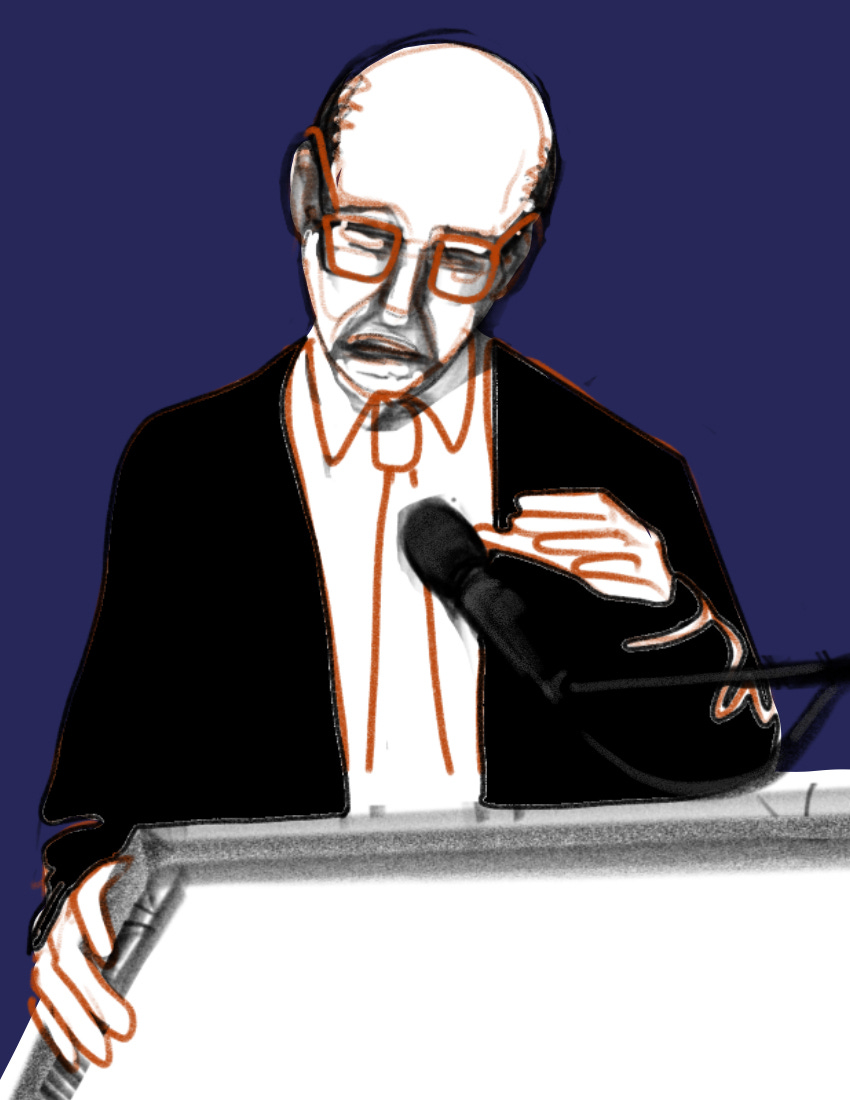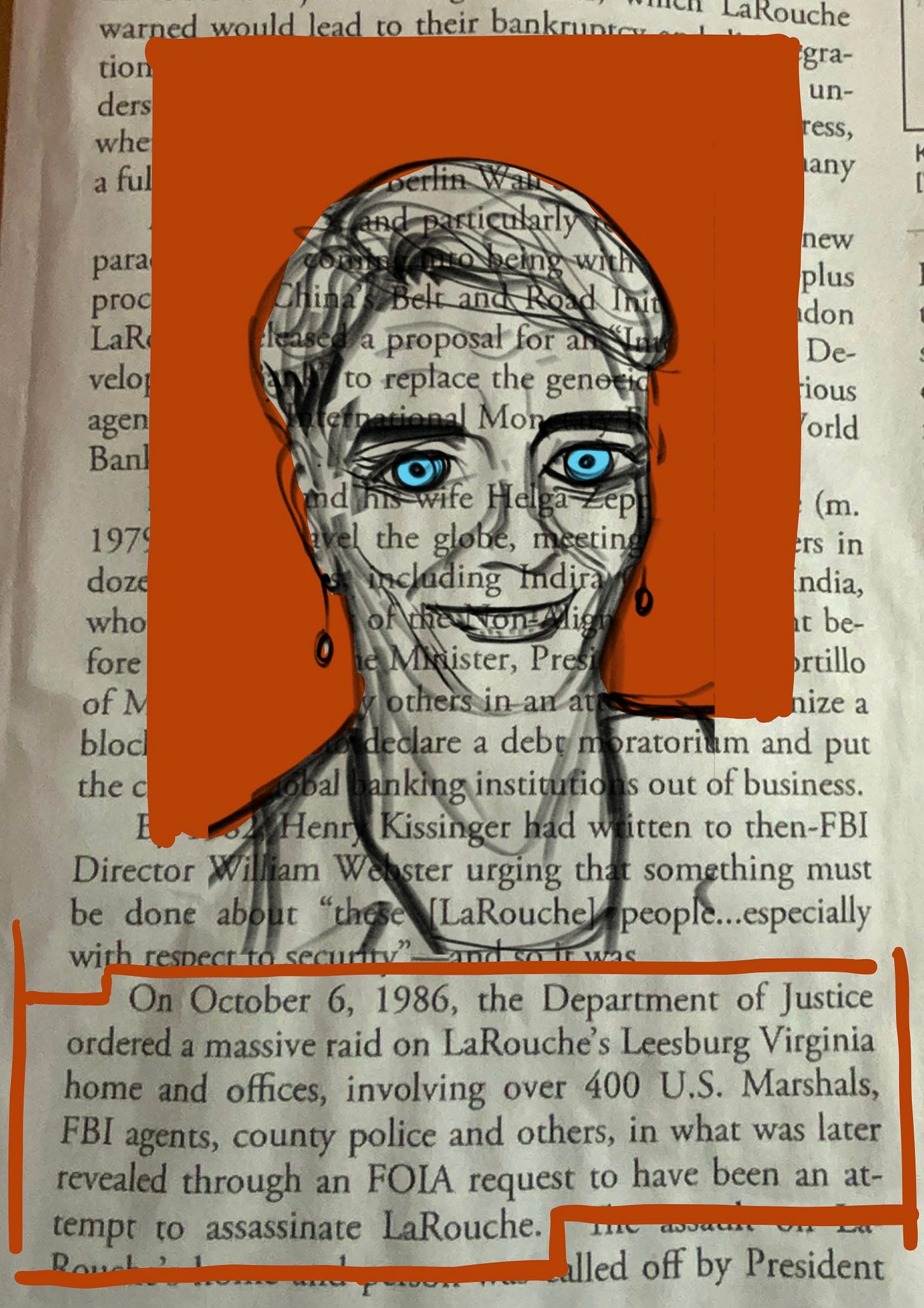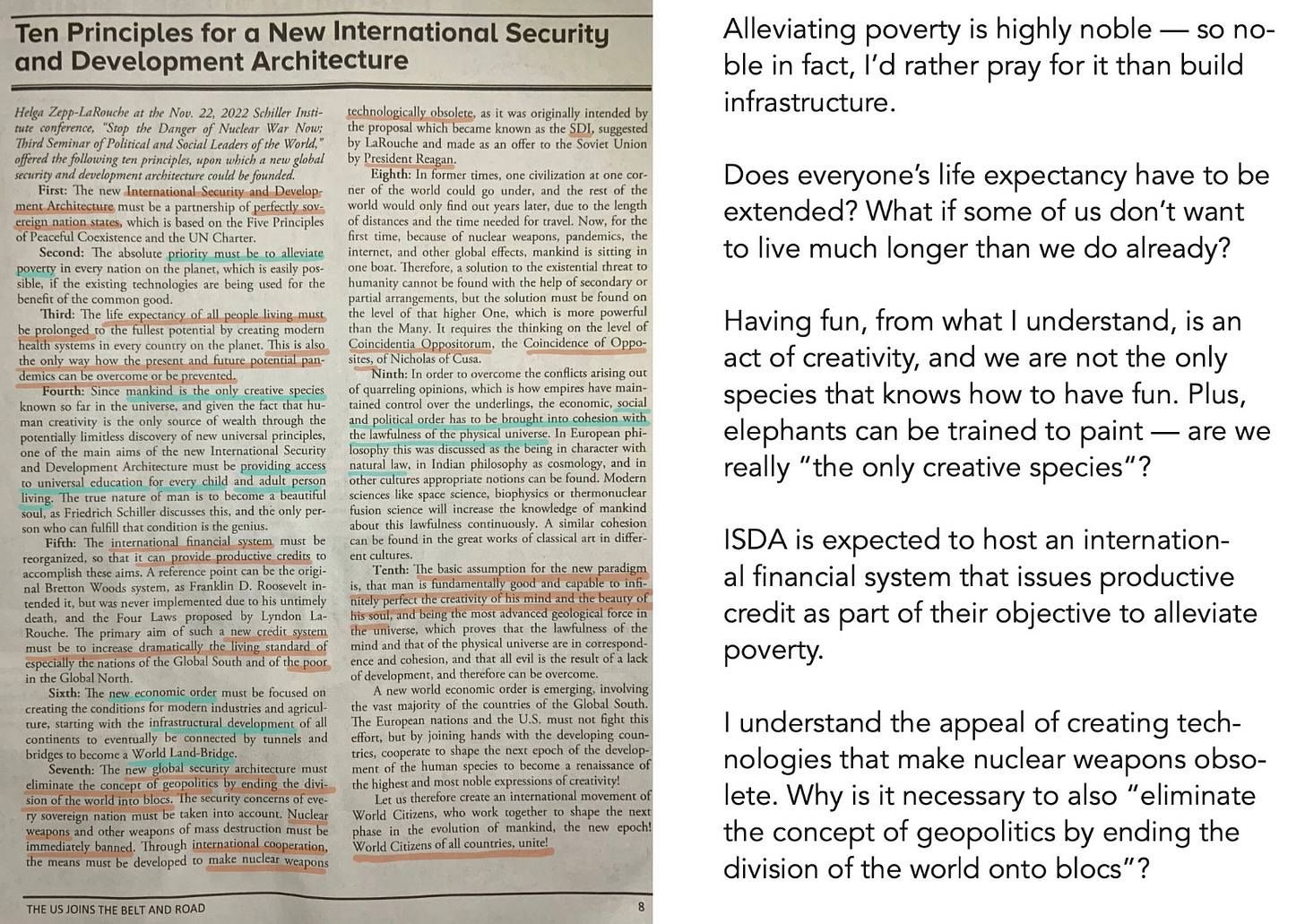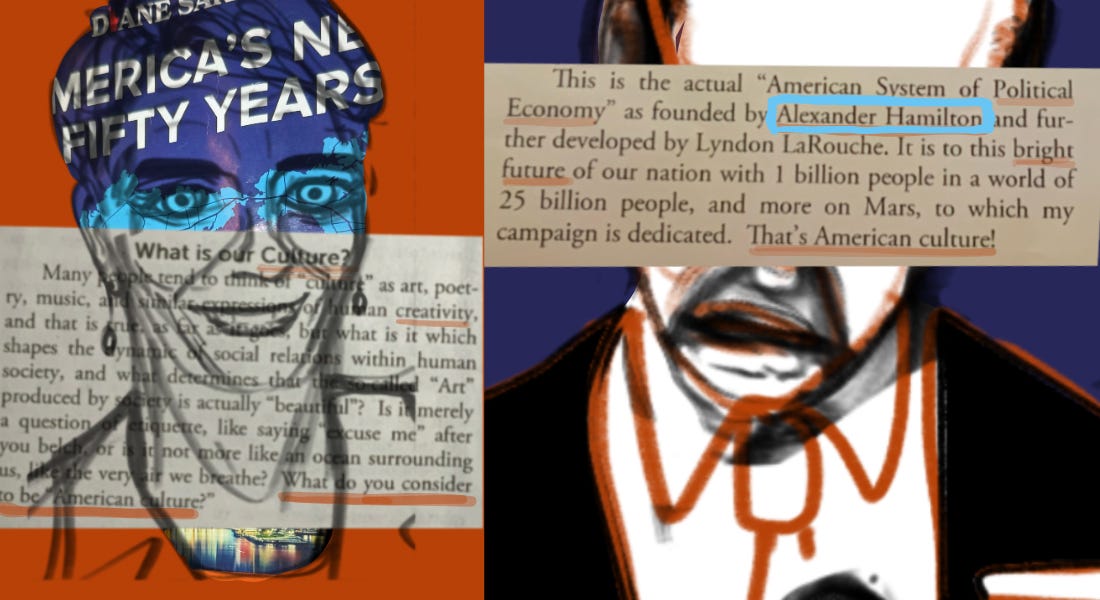Dear Mr. McAdams,
We were at the Rage Against the War Machine rally at the Washington Monument in DC on Sunday, Sept. 28th. Unfortunately, I couldn't stay long. As the music started during the first break, I dragged myself back to the car, still battling an infection. Despite my appearance being so brief, something intriguing did happened: while sitting on the lawn, someone walked over and handed us reading material distributed by NY’s Diane Sare, who’s gunning for Chuck Schumer’s seat.
I’ve known for a while that I share some of Sare’s values. She’s an anti-interventionist who opposes NATO. Besides criticizing US foreign policy, but also opposes the Federal Reserve. What I didn’t know was that she was mentored by Lyndon LaRouche — which is silly because she runs as an Independent who aligns with LaRouche’s ideas.
Growing up in the 90s, I had vague memories of hearing his name—associating him with radicalism akin to shock-jocks like Alex Jones. But where did that perception come from? Was it because he ran for president as a Democrat in '92 and '96? It’s high time I looked into him.
What is a LaRouche?
According to the CIA, Lyndon LaRouche and his followers were members of the U.S. Labor Party (USLP) who disrupted political events, attacked television networks, ran smear campaigns on people who asked questions about them, and organized hate campaigns against Jews (1), women, and other marginalized groups (1,2). In "Who or What is Lyndon LaRouche?", they describe him as the leader of a political cult who concocted “theories involving the Trilateral Commission, the Council on Foreign Relations, the Rockefellers, the British, and ‘Zionist agents’". (0)
Feminist reporter, Clara Fraser, describes him as an “amalgam of right and left politics, a tangled web of KKK, Freudian, encounter therapy, Populist, Ayn Rand-like, and Marxist notions“ in her piece, LaRouche: Sex Maniac and Demagogue, implying this to be the face of American fascism. She recognizes him as a former member of the SWP (Socialist Workers Party) — being one, herself — who went by the name Lynn Marcus. (2) Marxists speak of him through a resentment that sounds personal. (2,4)
Fraser asks, “What caused his turnabout from Marxism?” Understandably left unfulfilled by her own conclusions, she lets us know that “Newsweek speculates that ‘a romantic setback triggered a change in LaRouche’s personality and a shift to a more authoritarian leadership style’“. (2) What a hit piece, Ms. Fraser! You hit like a high school mean girl.
In America’s Next Fifty Years, Sare states he “was the author of hundreds of economic development proposals, as well as volumes of scientific, philosophical and strategic studies. He was a dramatic orator and advocate of classical drama and musical composition…“ Whether viewed through the eyes of his critics or his followers, LaRouche emerges as an enigma—a wildcard with a finger in almost every pie under the sun.
Peering Through the Straw Man -
A Coincidence of Opposites (LaRouchenomics)
When trying to view him past his effigy, I see a man who stood for big infrastructure projects funded by the government. Like Socrates of Plato’s Republic, he believed that intellectual development is essential to a well-functioning society, and that society should be ruled [by a leader] with reason and wisdom rather than the might of their wealth.
He taught that real economic growth and technological advancements are based on human creativity and the individual’s need to explore, experiment, and innovate. I’m under the impression that him and his followers view it as government’s job to facilitate the environment and resources that nurture this intellectual growth. Naturally, he stood for government supported projects of large scale infrastructure development.
One of his most agreeable positions was in favor of physical economic outputs over [industries grown on] speculative finance. However, he sees an economy as something that sets humans apart from animals, claiming that they don’t have anything like it. I must disagree because [supplies and demands] existed long before anyone invented the wheel. I don’t believe an economy needs to be built in order to exist. Our economic wilderness is a man made jungle that’s proliferating over technological advancements. Is there anything more unnatural than economic planning? Perhaps we should try to start governing the Amazon.
He warned against Nixon’s move to detach the US dollar from Gold but never urged a return to a commodity-based currency. He doesn’t appear to strictly stand for or against fiat currencies, as long as they trade on fixed exchange rates, as opposed to floating. He criticized global financial institutions like the IMF as well as the Federal Reserve but was comfortable with the idea of a national bank.
He favored protectionism over free trade, claiming that tariffs protect developed nations from de-industrializing and the impoverished labor of developing countries from being exploited. He was an anti-globalist against free trade, yet he trusted governments of different nations working together to build global infrastructure.
He appears to be a collection of contradictions but I believe that in order to understand why these contradictions can exist in one person, its helpful for us read the Executive Intelligence Review (EIR) — the most riveting magazine I’ve ever read! I found an issue of EIR earlier this year when researching the Invisible College. I didn’t know at the time that EIR was a LaRouche publication. The significance for me here, is that LaRouche’s group uncovered information that conforms to findings from William Stuart, author of The Invisible College: 9-11 to Armageddon.
According to Stuart, the Invisible College is an ancient lineage of people tied by bloodline, agenda, appetite for dominance, and participation in rituals of an ancient Elucinian mystery religion, who have been infiltrating and taking over governments at least since the fall of Rome and the creation of the Central Bank of Venice. By the 15th Century, they had taken over the English parliament and ushered in the era of English imperialism. (6)
By the late 18th Century, as the sun’s ability to set on the English empire began to spike, Stuart informs us that America, the young nation that had uniquely won its independence from the British crown, was already compromised. The US was fully infiltrated by 1888, making way for the establishment of the Council on Foreign Relations (CFR) in 1921 and 1973, the Trilateral Commission. (6)
Shattering Schacht and Klobbering Keynes -
(LaRouchenomics - cont’d)
He attacked the ideas and practices of Nazi German economic minister, Hjalmar Schacht, for the disastrous effects they had on the German economy. While appearing successful in the short term, Schacht's policies were unsustainable and led to massive unemployment and austerity measures. These policies, according to LaRouche, worsened the situation in Germany and laid the groundwork for Hitler's authoritarian regime. (3, 5)
He draws a parallel between Schacht's policies and modern economic theories, particularly those of Milton Friedman and John Maynard Keynes. He criticizes modern-day economists and bankers for supporting similar monetarist policies that prioritize financial paper over real economic growth, arguing that this mindset leads to economic crises and global instability. LaRouche warns that the continued reliance on Schacht-like policies by modern governments and financial institutions threatens the global economy. He suggests that these policies could lead to further economic collapses, wars, and humanitarian disasters if not addressed. (3)
The attack he launches on Keynesianism in “Why Ignorant Bankers Believe Schacht Succeeded“ is a brutal piece of work: “It was not irrelevant to the popularity of Keynesian views among former academic circles that these delusions were most readily accepted among paper-shuffling bureaucrats and among overaged college students who have never per formed a productive day's labor in their life.“ (3)
Another such attack was on the lawn of Queens College, in the form of a public debate. “Professor Abba Lerner, reputedly the leading resident Keynesian economist in the U.S.A., was selected for the contest.“ The debate ended with Lerner admitting that had Schacht’s policies been effectively implemented, Hitler would not have been necessary. (5)
LaRouche laments that “…pro-Synarchist, pro-Schachtian financiers’ effort to create a fascist internationalism during the post-Versailles decades, has prompted the financiers of today to seek every possible means to uproot and destroy the kind of agro-industrial constitutional republic which Roosevelt’s victory over Hitler et al. represented.“ Does his appreciation for FDR explain his insane levels of comfort with big government?
The Night They Came To Kill Him -
LaRouche’s New World Order (then and now)
In America’s Next Fifty Years, Sare discusses the time in ‘86 the DoJ attempted to eliminate him. His own account of how federal agents descended upon his Leesburg home on the night of Oct. 6th, 1986 as written in The Night They Came to Kill Me is — like most issues of EIR — a dense, yet suspenseful read. In it, he describes and connects this attempt with an earlier, in ‘73, explaining how his “international, as well as U.S. role in the development of the SDI proposal“ was the basis. (5)
At age of two in ‘86, I was too young to remember that the SDI was the Strategic Defense Initiative, an idea that prevented Reagan and Gorbachev from reaching an agreement at the ‘86 Reykjavik Summit.
“In …, Oct. 6-7, 1986, the obvious motive for
the projected official killing of me, my wife, and others on
that occasion, was my role in the development of the SDI.
Ironically, but not accidentally, this operation was unleashed
at the time President Reagan was about to meet Gorbachev in
Reykjavik, Iceland, where the President, once again, firmly
restated his commitment to SDI.“ (5)
I appreciate him unequivocally declaring his involvement with the SDI. AI hesitates, noting, 'Though LaRouche’s role in influencing SDI is debatable and not widely acknowledged… he and his movement strongly promoted the idea,' but this initiative has his name all over it. SDI aligns with his hallmark principles: large-scale infrastructure development, technological advancements backed by multiple governments, and peace maintained through agreements — a fantastic departure from the principle of non-aggression.
Sare gives us the Ten Principles for a new International Security and Development Architecture (ISDA), first revealed by LaRouche’s wife, Helga Zepp-LaRouche, at a Schiller Institute Conference in 2022. In a new cold war era, I believe the ISDA is a modernized replacement of the SDI. As I go through it I’m left with a number of questions. Here are just a few:
What is a perfectly sovereign nation? Is there such a thing as a perfectly sovereign person?
Coincidentia Oppositorum, or the coincidence of opposites is a very fancy way of saying it’s valuable for us to tolerate each others differences.
To believe that “…social and political order has to be brought into cohesion with the lawfulness of the physical universe“ — Mr. McAdams, am I smoking crack? I love the idea of opening up new avenues for exploring nuclear fusion, but how do I feel about having to log into the ISDA network through my Eclipse interface everyday, in order to sync my code with updates made by teammates I have in China? I don’t know, because I can’t even start to imagine the clearances I had to pass in order to get a development gig on the ISDA.
The last principle tells us the assumption being made about the nature of humanity, upon which the rest of the principles rest.
Conclusions -
A Dangerous Assumption (Hamiltonianism vs the Human Being)
I don’t know if he really organized and ran a cult but he seemed to trust very few people. If I’m right, the assumption being made about human nature in the last principle of the ISDA — that “man is fundamentally good and capable to infinitely perfect the creativity of his mind and beauty of his soul“ — is unusually optimistic.
Why make such an assumption about man when it’s widely known and accepted that the human being is a walking contradiction? Every individual is composed of good and bad characteristics. We should always be trying to be our best but we are naturally prone to making mistakes.
Whether we’re actively establishing and managing peace through coordinated efforts, or simply satiating an intellectual curiosity, we’re trusting our internal motivations to be functioning reliably. Culture is expected to flourish among people who are equipped to perfect their creativity. However, the human being — much like a horse — is unpredictable. Given such a high budget proposal, there is no guarantee that when brought to the stream, that either of them are going to want to drink. Freedom is key to creativity, and an important part of it is getting to decide whether we want to participate or if we’d rather do our own thing.
They are building expensive ideas on dangerously incomplete assumptions about human nature, and they also seem to be failing to see the individual from the trees.
In Sare’s closing statements, she asks a question about culture: “What do you consider to be American culture?“ In her very last paragraph, she can’t help but give us the answer, substantiating it with “That’s American culture!“ Her definition of American culture includes the world, as well as Mars, which I can tackle if I can move past her mention of Alexander Hamilton and political economy.
Alex Hamilton, the first U.S. Secretary of the Treasury, laid the groundwork for the “American system“ of political economy, and is well known for his support of a strong national government. His adversary on the matter, Thomas Jefferson, believed in an agrarian society where states retained significant power and favored limited federal government intervention.
This rivalry is well documented across Hamilton’s reports, The Federalist Papers (7), as well as letters of correspondence between Jefferson, Hamilton, and James Madison (who originally favored Hamilton but eventually sided with Jefferson). These parameters of the early American political landscape have undeniably echoed through our history and influence us, today. Hamiltonians and LaRoucheans align in their belief in the positive role of the federal government in shaping the economy. Many of FDR's New Deal policies, particularly those focused on economic modernization and federal intervention, can be seen as an evolution of the Hamiltonian approach to political economy.
From my understanding, political economy is the study of how state invention and laws and political ideologies influence markets, labor, and capital. In our libertarian tradition of political economy, we prefer limiting state intervention in people’s lives and in the market as a way to maximize the autonomy of individuals to pursue their interests on a free market. Order emerges out of voluntary transactions, allocating resources efficiently. The resulting system is self-governing, which is what makes economic planning an unnatural course of action.
Before I go off to continue processing all of this, I’d like to leave you with a few pictures and clips from our recent trip to the well manicured headquarters of the war machine.
The drive was absolutely beautiful.
Hope to see you next time.
Most sincerely,
Zareen
PS: Writing this has been a good way for me to return to my Rumble channel.
(0) https://www.cia.gov/readingroom/docs/CIA-RDP90-00806R000100640032-5.pdf
(1) https://www.cia.gov/readingroom/docs/CIA-RDP88-01070R000201050003-9.pdf
(2) https://socialism.com/fs-article/larouche-sex-maniac-and-demagogue/
(3) Why Ignorant Bankers Think Schacht Succeeded
(4) Lyndon LaRouche: A Warning & Lesson For the Communist Left - Revolutionary Left Radio
(5) The Night They Came to Kill Me
(6) The Invisible College: 9-11 to Armageddon
(7) The Federalist Papers by Kyle Scott
(8) Olof Palme murder: Sweden believes it knows who killed PM in 1986









“By the late 18th Century, as the sun’s ability to set on the English empire began to spike “ 😂
Good information on topics Im just beginning to have some understanding of. Thanks for sharing.